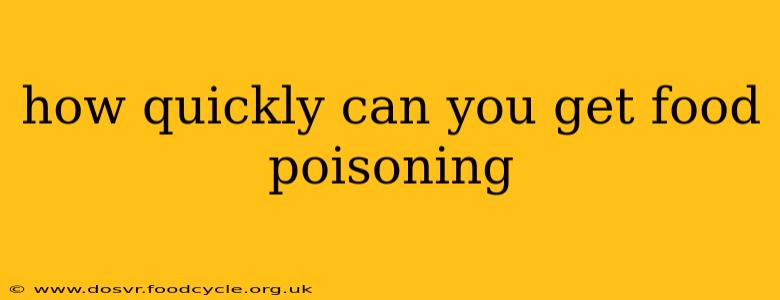How Quickly Can You Get Food Poisoning? The Speed of Sickness
Food poisoning, also known as foodborne illness, can develop surprisingly quickly after consuming contaminated food. The incubation period – the time between eating the contaminated food and experiencing symptoms – varies greatly depending on several factors, including the type of bacteria, virus, or parasite responsible, the amount of contamination, and the individual's immune system. Let's explore the timeline and answer some common questions.
How soon after eating contaminated food do symptoms usually appear?
Symptoms of food poisoning can appear anywhere from a few hours to several days after consuming contaminated food. Some bacteria, like Staphylococcus aureus (Staph), cause symptoms to appear rapidly, often within 30 minutes to six hours. Others, such as Salmonella or Campylobacter, may have a longer incubation period, typically ranging from 12 to 72 hours or even longer. Viral foodborne illnesses can also have variable incubation periods.
What are the fastest-acting types of food poisoning?
Among the quickest-acting foodborne illnesses are those caused by:
- Staphylococcus aureus (Staph): This bacteria produces toxins that cause rapid onset symptoms, usually within hours of consumption. These symptoms are typically gastrointestinal in nature, including nausea, vomiting, and diarrhea.
- Bacillus cereus: This bacterium, commonly found in rice and certain spices, produces toxins that can cause vomiting within 30 minutes to 6 hours, and diarrhea 6 to 15 hours after consumption.
Can food poisoning symptoms appear immediately after eating?
While rare, in some cases with high levels of contamination or particularly virulent toxins, symptoms can appear very quickly, even within minutes. This is more likely with pre-formed toxins, like those produced by Staphylococcus aureus, than with infections caused by bacteria that must first multiply in the gut.
What are the symptoms of food poisoning, and how long do they last?
Symptoms of food poisoning vary depending on the causative agent but commonly include:
- Nausea and Vomiting: Often the most immediate and prominent symptoms.
- Diarrhea: Can range from mild to severe, and may be watery or bloody.
- Stomach Cramps and Abdominal Pain: These can be intense and debilitating.
- Fever: May be present, particularly with bacterial infections.
- Headache: A common symptom associated with some types of food poisoning.
- Muscle Aches: Less common but possible.
The duration of symptoms also varies, but most cases resolve within a few days. However, in severe cases, symptoms may last longer and require medical attention.
When should I seek medical attention for food poisoning?
While many cases of food poisoning resolve on their own, it's important to seek medical attention if you experience:
- Severe dehydration: This can be life-threatening, particularly in young children and the elderly.
- Bloody diarrhea: This could indicate a more serious infection.
- High fever: A persistent high fever warrants medical evaluation.
- Symptoms lasting longer than a few days: Prolonged illness requires investigation.
- Symptoms of neurological involvement: such as weakness, numbness, or confusion.
This information is for general knowledge and doesn't constitute medical advice. Always consult a doctor if you suspect you have food poisoning, especially if your symptoms are severe or persistent. Practicing good food safety habits is the best way to prevent foodborne illness.
